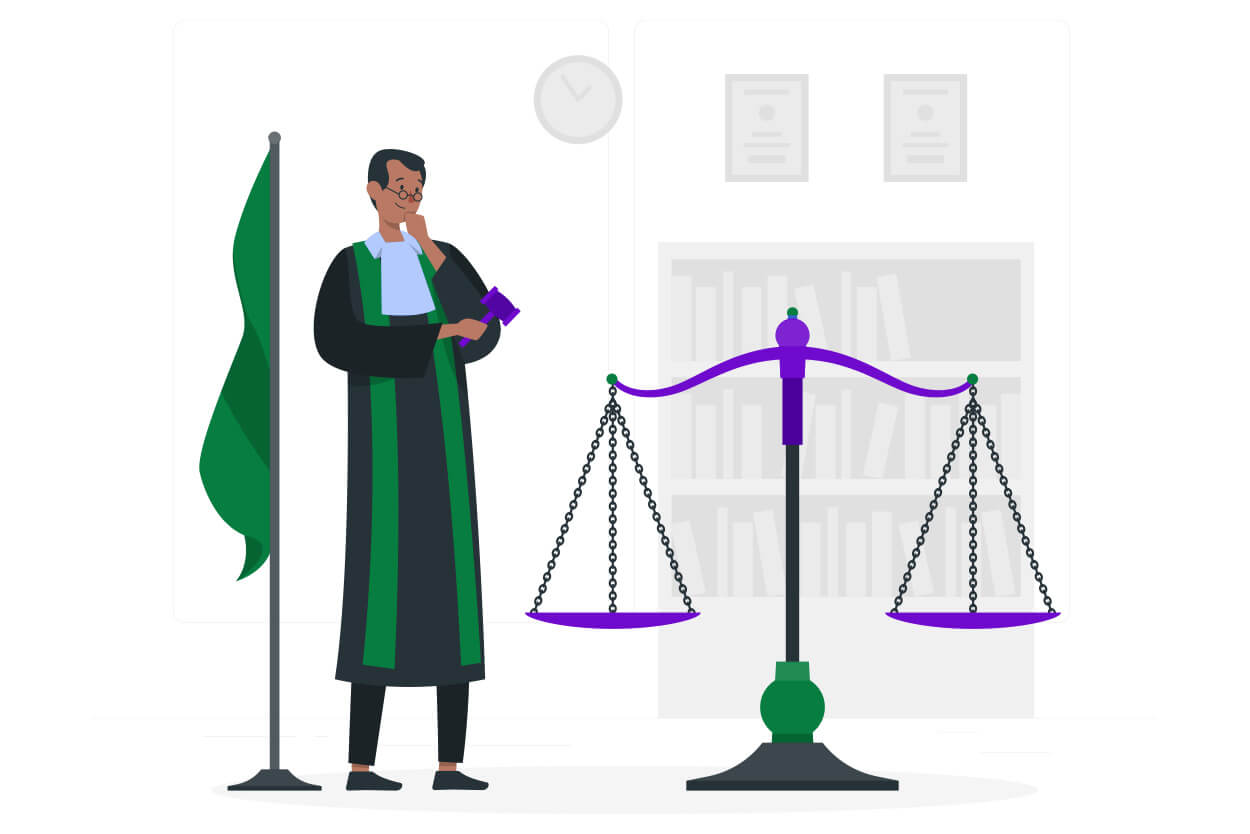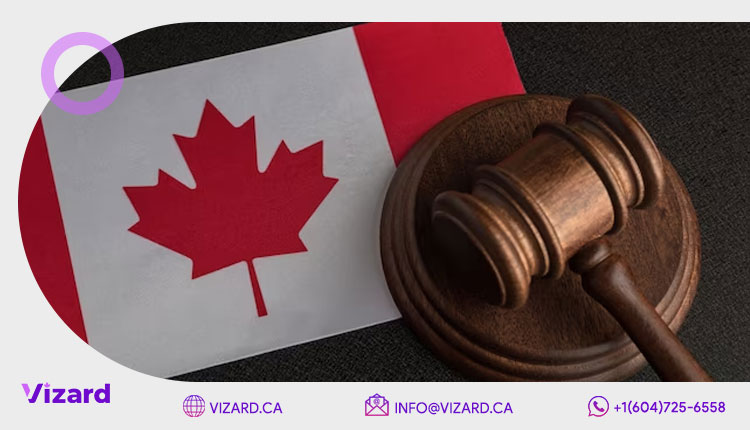

The types of immigration decisions that are eligible for judicial review at the Federal Court of Canada include those made by the Immigration, Refugees and Citizenship Canada (IRCC) and the Canada Border Services Agency (CBSA). Examples of such decisions include refusals of:
It is important to note that not all decisions made by IRCC and CBSA are eligible for judicial review and it is recommended to seek legal advice before initiating the process.

What is The Judicial Review Process?
A judicial review is a formal legal process in which a court of law examines the actions and decisions of a decision-maker, such as a government agency or administrative body. In the context of immigration law, an individual may seek a judicial review of a decision made by Immigration, Refugees, and Citizenship Canada (IRCC), such as the rejection of an application for a study permit, work permit, permanent residence, or other final decision.
The process of filing for a judicial review involves submitting an application for leave and judicial review to the Federal Court. If the application is successful, the court will overturn the original decision and direct that the application be reconsidered by another immigration officer.
The standard of review applied by the Federal Court in immigration judicial review cases is typically one of reasonableness, unless there has been a breach of natural justice or a failure to adhere to principles of procedural fairness. This means that the court will evaluate whether the decision made by IRCC is reasonable, taking into account factors such as coherence, rationality, and adherence to the facts and laws in question.
It is important to note that under the reasonableness standard, decision-makers are generally entitled to deference. This means that the Federal Court will not lightly overturn a decision or substitute its own judgment for that of the decision-maker. Instead, the court will consider whether the decision falls within a range of acceptable outcomes.
[1] Natural justice refers to the principles of fairness and impartiality that must be followed when making decisions that affect people’s rights, interests or legitimate expectations.
[2] Deference refers to the principle that courts should give weight to the decisions of other branches of government or administrative bodies, assuming that they have the expertise and mandate to make certain decisions.
[3] The range of acceptable outcomes means that the court will consider a decision reasonable if it falls within a range of possible, acceptable results which are defensible in respect of the facts and law.

Strict deadlines associated with initiating a judicial review in the context of immigration law
It is imperative to be aware of the strict deadlines associated with initiating a judicial review in the context of immigration law. The Federal Court has established specific timeframes for filing an application for leave and judicial review, which vary depending on the origin of the matter. In the event that the matter arises within Canada, an individual has only 15 days from the receipt of the refusal letter to file the application. Conversely, if the matter arises outside of Canada, the individual has 60 days from receipt of the refusal letter to file the application.
It is important to note that while extensions of time may be granted, they are only granted in cases where there are special reasons for the delay. Therefore, it is crucial to act swiftly and efficiently in order to ensure that the application is filed within the prescribed time frame. This requires a thorough understanding of the legal process, as well as the ability to navigate the complexities of the immigration system. Our immigration firm is well-equipped to assist you in this regard and ensure that your application is filed within the strict deadlines imposed by the Federal Court.
Judicial review Process
Obtaining a judicial review in immigration law requires a thorough understanding of the legal process and strict adherence to deadlines. The process begins by filing an application for leave and judicial review at the Federal Court, which serves as a request for permission to proceed with the review. This application must be accompanied by a detailed explanation of why the decision made by the Immigration, Refugees and Citizenship Canada (IRCC) is unreasonable or incorrect.
Once the application for leave and judicial review has been filed and served to the Department of Justice (DOJ), the DOJ will provide a notice of appearance indicating their intention to respond to the application. If no reasons for the decision were received, the Federal Court will make a request to IRCC for the reasons under Rule 9. This will include the notes of the immigration officer.
The next step is to prepare an applicant’s record, including a memorandum of argument, which should contain legal research and arguments to convince a judge that IRCC’s decision is unreasonable. IRCC, who will be represented by a lawyer from the DOJ, will also have an opportunity to provide their own memorandum of argument. The applicant will then have an opportunity to provide a reply to the DOJ’s memorandum of argument.
It is important to note that leave must be granted by a judge in order to proceed with a judicial review. A judge will review the applicant’s and respondent’s records on paper and has discretion in deciding whether or not to grant the application for leave. In most cases, if the application has little chance of success, it will be dismissed. It is worth noting that the Federal Court only grants leave in 20% of applications for immigration matters.
If leave is granted, a hearing will be scheduled for the application for judicial review. During the hearing, the applicant will argue that IRCC made an error of fact, law or fact and law, while IRCC will argue that there is no error. The judge will examine the evidence that was before the immigration officer at the time of the decision and will further examine the reasons for the decision and how the law was applied. The court will issue a decision after the hearing, which can take between one to six months depending on the complexity of the matter.
It is important to retain an immigration lawyer with litigation experience to properly research, argue and prepare your application for judicial review, as there are various deadlines and specific rules that must be respected throughout the proceedings. Additionally, it is important to note that if your application is rejected on leave, you cannot appeal it. Therefore, it is crucial to ensure that your application is properly prepared and argued to increase your chances of success.

Is a judicial review the right option for my situation?
A judicial review is a legal process through which a final decision made by an administrative body, such as the Immigration, Refugees and Citizenship Canada (IRCC), can be challenged. The Federal Court is responsible for conducting judicial reviews and it is important to understand that this process should only be considered as a last resort.
Before filing an application for leave and judicial review, it is essential to ensure that all other available options have been exhausted. For example, if you have a right to appeal a decision made by IRCC at the Immigration and Appeal Division of the Immigration and Refugee Board, it is expected that you seek an appeal at the IAD before filing an application for leave and judicial review.
It is important to note that the Federal Court will only consider judicial reviews of final decisions made by the administrative body. If you have received a letter of procedural fairness from IRCC, this indicates that the administrative process is still ongoing and a judicial review would be considered premature.
Additionally, it is important to understand that a judicial review is a review of a decision by a judge, and the initial application is the basis for the judicial review. In most cases, new evidence cannot be presented during a judicial review. If your initial application was weak or incomplete, a judicial review may not be the most appropriate course of action. Instead, you may want to consider strengthening your immigration application and reapplying, and if refused again, filing an application for leave and judicial review for the second, stronger application.
It is highly recommended to retain an immigration lawyer with litigation experience to properly advise and assist in the preparation of an application for judicial review. The process is complex and there are various deadlines and specific rules that must be respected throughout the proceedings.
Differences between an appeal and a judicial review
An appeal is a process by which a higher court reviews the decision of a lower court to determine if there were any errors or errors of law made in the original decision. An appeal is typically used to correct legal errors or to ensure that the law was applied correctly.
A judicial review, on the other hand, is a legal process in which a court reviews the actions or decisions of a government official or agency to determine if they were lawful and within the scope of their authority. A judicial review is typically used to ensure that government actions are fair and reasonable and that they comply with laws and regulations.
The main difference between an appeal and a judicial review is that an appeal is focused on correcting legal errors, while a judicial review is focused on ensuring that government actions are lawful and fair.

If the Federal Court denied leave for my application for judicial review of an immigration decision, is it possible to appeal the decision?
In most cases, decisions made by the Federal Court can be appealed to the Federal Court of Appeal. However, there are some exceptions. For example, decisions made on an application for leave and judicial review are final and cannot be appealed. Additionally, certain decisions made by the Federal Court, such as those made under the Federal Courts Rules, may also be final and not subject to appeal. It is important to consult with a legal professional to determine whether an appeal is possible for a specific decision made by the Federal Court.
Can I file my own judicial review at the Federal Court of Canada?
It is possible to file a judicial review at the Federal Court of Canada without the assistance of a lawyer, however, it is highly recommended to retain an immigration lawyer with litigation experience to research, argue and properly prepare your application for judicial review. The process is complex and involves strict time limits, specific rules, and procedures that must be respected throughout the proceedings. An experienced immigration lawyer will be able to navigate the process and increase your chances of success.
Contact Vizard
If you have exhausted all other avenues and believe that your immigration decision may be eligible for judicial review at the Federal Court of Canada, it is highly recommended to seek the assistance of an experienced immigration firm.
Our immigration firm specializes in providing expert guidance and representation for individuals seeking to initiate a judicial review for a range of immigration decisions, including study permit applications, permanent residence applications, and more. Our team of experienced attorneys will work closely with you to review the details of your case, provide an assessment of your chances for success, and guide you through the entire judicial review process.
With a proven track record of success, our firm is committed to helping you achieve the best possible outcome. Contact us today to schedule a consultation and learn more about how we can assist you with your judicial review.
Related Links: